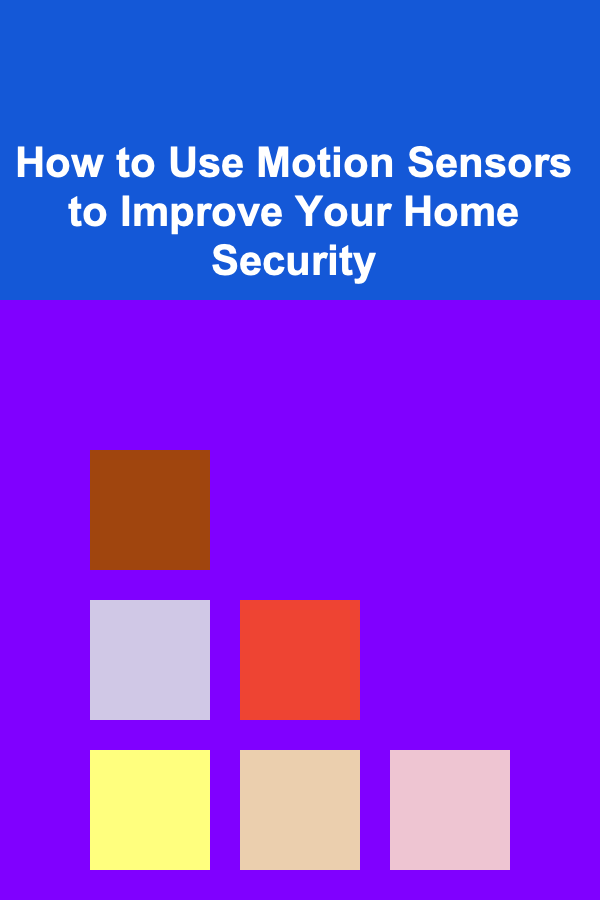
How to Choose the Right Home Security Cameras for Your Property
ebook include PDF & Audio bundle (Micro Guide)
$12.99$9.99
Limited Time Offer! Order within the next:

Home security is a critical aspect of modern living, providing peace of mind for homeowners by protecting their families and valuables. In today's world, one of the most effective ways to safeguard your property is through the installation of security cameras. Whether you live in a house, an apartment, or a townhouse, the right home security cameras can serve as your eyes and ears, monitoring your property 24/7.
With a myriad of options available, choosing the right security cameras can be a daunting task. From wired to wireless, indoor to outdoor, and night vision to motion detection, there are several factors that influence the selection of the best security camera for your needs. This guide will walk you through the essential considerations when choosing home security cameras, helping you make an informed decision tailored to your property's unique security needs.
Understanding Your Security Needs
Before purchasing security cameras, it's essential to understand your specific security requirements. Consider the following factors:
A. Property Size and Layout
- Large properties may require multiple cameras to cover the entire area, including entry points, driveways, and backyards.
- Smaller homes or apartments may only need cameras at key locations, such as the front door or hallway.
The size and layout of your property directly influence the number of cameras needed and their placement.
B. Vulnerable Entry Points
- Doors and windows are the most common points of entry for burglars, so placing cameras near these areas is crucial.
- Driveways and garages should also be monitored, as vehicles and garage tools are often targeted by criminals.
By evaluating the vulnerable spots on your property, you can make sure that you're placing cameras in areas where they'll be most effective.
C. Level of Intrusion Protection
- High-risk areas like the backdoor or basement may require cameras with higher features, such as motion detection or night vision.
- Low-risk areas like gardens or side yards can be monitored with basic models that don't require advanced features.
Understanding how vulnerable your home is to different types of threats will help guide your camera selection process.
Wired vs. Wireless Cameras
When choosing a security camera, one of the first decisions you'll need to make is whether to opt for a wired or wireless model.
A. Wired Cameras
Wired security cameras are connected directly to your home's power source and recording system via cables. They are often considered more reliable because they don't depend on Wi-Fi signals or batteries.
Advantages of wired cameras:
- Stable Connection: Wired cameras offer consistent, uninterrupted video streaming, making them a good option for areas with poor Wi-Fi signals.
- Better Video Quality: Typically, wired cameras provide higher resolution video and clearer footage.
- No Battery Issues: Unlike wireless cameras, wired cameras don't require frequent battery changes or recharges.
Disadvantages of wired cameras:
- Installation Complexity: Installing wired cameras can be time-consuming and may require professional installation.
- Limited Placement: The placement of wired cameras is restricted by the need for power outlets and the length of the cables.
B. Wireless Cameras
Wireless cameras connect to your home's Wi-Fi network and typically run on batteries, though some can be plugged into an electrical outlet.
Advantages of wireless cameras:
- Easy Installation: Wireless cameras are easier to install, making them a popular option for DIY enthusiasts.
- Flexible Placement: Without the need for wiring, you can place cameras in almost any location, both indoors and outdoors.
- Remote Access: Wireless cameras can be monitored remotely through smartphone apps, allowing you to check footage from anywhere.
Disadvantages of wireless cameras:
- Dependence on Wi-Fi: Wireless cameras rely on a stable internet connection. If your Wi-Fi goes down, your cameras may stop functioning.
- Battery Life: Wireless cameras require regular battery changes or charging, depending on the model.
Camera Resolution and Image Quality
Resolution is one of the most important factors to consider when choosing home security cameras. Higher resolution cameras provide clearer and more detailed images, making it easier to identify faces, vehicles, and objects.
A. 1080p vs. 4K Resolution
- 1080p is considered the standard resolution for most home security cameras. It provides a good balance between image quality and file size, offering clear images suitable for most surveillance needs.
- 4K resolution is ideal if you want the highest quality footage possible. 4K cameras provide four times the resolution of 1080p cameras, resulting in highly detailed footage. However, they require more storage space and bandwidth.
B. Field of View (FOV)
The field of view refers to the area that the camera can capture. Cameras with a wider FOV can cover more ground and are typically better for monitoring large areas.
- Standard FOV: Most home security cameras offer a standard FOV of 90 to 120 degrees.
- Wide-angle FOV: Some models offer up to 180 degrees, allowing you to capture an even larger area.
C. Night Vision
Night vision is essential for ensuring your cameras can capture clear footage in low-light conditions. Cameras equipped with infrared (IR) LEDs or color night vision provide detailed images even in total darkness.
- IR Night Vision: Provides black-and-white footage in low light.
- Color Night Vision: Offers color footage at night, which can be particularly helpful for identifying details like clothing color or vehicle types.
Motion Detection and Alerts
Motion detection is a key feature in modern security cameras, allowing the camera to activate when movement is detected in its field of view. This helps save storage space and ensures that you only record relevant footage.
A. Types of Motion Detection
- Passive Infrared (PIR): PIR sensors detect heat signatures from objects and people. They are effective for detecting human motion.
- Pixel-Based Detection: This system analyzes changes in the pixels within the camera's frame to detect movement, which is less prone to false alarms from environmental factors like trees swaying in the wind.
B. Motion Alerts
Most cameras with motion detection come with a feature that sends real-time alerts to your smartphone or email when movement is detected. You can adjust the sensitivity of motion detection to minimize false alarms, such as those caused by pets or small animals.
Storage Options
Security cameras record footage that needs to be stored somewhere. Depending on the camera type, you'll have a few options for how the footage is saved.
A. Cloud Storage
Cloud storage allows you to store your camera footage remotely, accessible via an internet connection. It's convenient because you don't have to worry about physical storage devices.
Advantages of cloud storage:
- Remote Access: You can access your footage from anywhere with an internet connection.
- Automatic Backup: Your footage is regularly backed up, reducing the risk of losing data.
Disadvantages of cloud storage:
- Subscription Fees: Most cloud storage services charge a monthly or annual fee.
- Dependence on Internet: If your internet connection goes down, you may lose access to your footage.
B. Local Storage (SD Cards and DVR/NVR)
Some cameras come with a local storage option, such as an SD card or a digital video recorder (DVR) or network video recorder (NVR) system for wired cameras.
Advantages of local storage:
- No Subscription Fees: Once you purchase the hardware, there are no ongoing costs.
- Continuous Recording: Cameras with local storage can often record continuously, unlike cloud storage, which may only store motion-triggered footage.
Disadvantages of local storage:
- Limited Storage Capacity: Depending on the size of your storage, you may run out of space quickly, especially with high-resolution footage.
- Vulnerable to Theft or Damage: If the camera is stolen or damaged, you may lose all recorded footage.
Integration with Other Smart Home Devices
If you already have a smart home setup, it's important to choose security cameras that integrate seamlessly with other devices such as smart locks, doorbell cameras, and home automation systems.
A. Voice Assistants
Many security cameras work with popular voice assistants like Amazon Alexa, Google Assistant, and Apple Siri. Voice control allows you to operate your cameras hands-free, asking questions like "Show me the front door camera" or "Turn on the security system."
B. Smart Home Automation
Some security cameras integrate with smart home hubs like SmartThings or Apple HomeKit, enabling automated responses based on certain triggers. For example, you can set your lights to turn on when the camera detects motion, or have the system alert you if someone approaches the door.
Budget Considerations
Home security cameras come in a wide range of prices, from budget-friendly options to high-end models with advanced features. While it's important to stick to your budget, you should also consider the long-term investment in your home's safety. You may find that investing in higher-quality cameras upfront can save you money in the future by avoiding the need for replacements or upgrades.
A. Cheap Cameras
While inexpensive, these cameras often lack features like high resolution, cloud storage, or advanced motion detection. They may be suitable for a basic surveillance system but may not offer the level of protection needed for more complex setups.
B. Mid-Range Cameras
Mid-range cameras typically offer a good balance between features and price, providing high-resolution video, motion detection, and cloud storage without breaking the bank.
C. Premium Cameras
Premium cameras offer top-of-the-line features, such as 4K resolution, AI-powered motion detection, cloud storage, and advanced night vision. These cameras are perfect for homeowners who want the highest level of security and are willing to pay for it.
Conclusion
Choosing the right home security cameras for your property requires thoughtful consideration of several factors, including your budget, property layout, and the specific security needs of your home. By understanding the types of cameras available, their features, and how they integrate with other security systems, you can make an informed decision that enhances your home's safety. Whether you opt for wired or wireless cameras, high-resolution models with night vision, or motion detection, the right camera setup will help deter intruders and provide peace of mind for you and your family.

How to Clean Your Home Naturally Using Everyday Ingredients
Read More
How to Offer Online Tutoring Services and Make Money from Home
Read More
How to Start a Side Hustle to Increase Your Monthly Income
Read More
How to Use Motion Sensors to Improve Your Home Security
Read More
The Brand Strategist's Blueprint: Building Powerful Brands from the Ground Up
Read More
What Are the Key Steps to Organizing Your Bathroom?
Read MoreOther Products

How to Clean Your Home Naturally Using Everyday Ingredients
Read More
How to Offer Online Tutoring Services and Make Money from Home
Read More
How to Start a Side Hustle to Increase Your Monthly Income
Read More
How to Use Motion Sensors to Improve Your Home Security
Read More
The Brand Strategist's Blueprint: Building Powerful Brands from the Ground Up
Read More